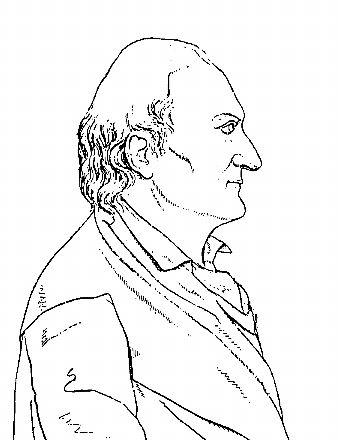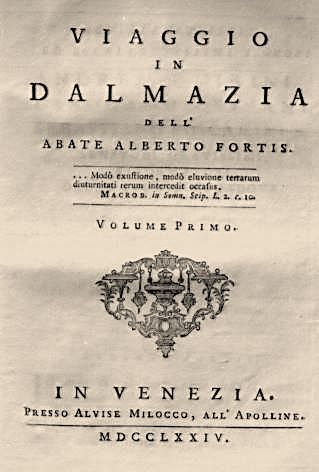Alberto Fortis on:
[Wikipedia]
[Google]
[Amazon]
 Alberto Fortis (9 or 11 November 1741 – 21 October 1803) was an Italian writer, naturalist and cartographer, citizen of
Alberto Fortis (9 or 11 November 1741 – 21 October 1803) was an Italian writer, naturalist and cartographer, citizen of
 *
*
*
*
 Alberto Fortis (9 or 11 November 1741 – 21 October 1803) was an Italian writer, naturalist and cartographer, citizen of
Alberto Fortis (9 or 11 November 1741 – 21 October 1803) was an Italian writer, naturalist and cartographer, citizen of Republic of Venice
The Republic of Venice, officially the Most Serene Republic of Venice and traditionally known as La Serenissima, was a sovereign state and Maritime republics, maritime republic with its capital in Venice. Founded, according to tradition, in 697 ...
.
Life
His real name was Giovanni Battista Fortis (his religious name was ''Alberto'') and he was born inPadua
Padua ( ) is a city and ''comune'' (municipality) in Veneto, northern Italy, and the capital of the province of Padua. The city lies on the banks of the river Bacchiglione, west of Venice and southeast of Vicenza, and has a population of 20 ...
on either 9 or 11 November 1741. He journeyed extensively in Venetian Dalmatia
Venetian Dalmatia () refers to the territories of Dalmatia under the rule of the Republic of Venice, mainly from the 15th to the 18th centuries. Dalmatia was first sold to Venice in 1409 but Venetian Dalmatia was not fully consolidated until 1420, ...
. His best-known work is '' Viaggio in Dalmazia'' (Journey to Dalmatia), originally published in 1774 and first published in London in 1778.
The highlight of the book is the description of Morlachia, a historical region currently located in Croatia named after the Morlachs
Morlachs ( sh-Latn-Cyrl, Morlaci, Морлаци; ; ) is an exonym used for a rural Christian community in Herzegovina, Lika and the Dalmatian Hinterland. The term was initially used for a bilingual Vlach pastoralist community in the mountain ...
that inhabited the region. In his book, Fortis presented his literary discovery "Hasanaginica" as a Morlach (Vlach) ballad. Larry Wolff believed Fortis wrote the ballad as a poetry of South Slavs rather than a poetry of the Morlachs. Fortis believed that the Morlachs
Morlachs ( sh-Latn-Cyrl, Morlaci, Морлаци; ; ) is an exonym used for a rural Christian community in Herzegovina, Lika and the Dalmatian Hinterland. The term was initially used for a bilingual Vlach pastoralist community in the mountain ...
preserved their old customs
and clothes. Their ethnographic traits were traditional clothing, use of the gusle
The gusle () or lahuta (; related to English ''lute'') is a bowed single- stringed musical instrument (and musical style) traditionally used in the Dinarides region of Southeastern Europe (in the Balkans). The instrument is always accompanie ...
musical instrument accompanied with epic singing. He also published several specimens of Morlach songs. Fortis noted that the Slavic-speaking Morlachs called themselves “Vlachs”, but refuted the assumption that they might be related to the Latin-speaking Vlachs
Vlach ( ), also Wallachian and many other variants, is a term and exonym used from the Middle Ages until the Modern Era to designate speakers of Eastern Romance languages living in Southeast Europe—south of the Danube (the Balkan peninsula ...
.
Alberto Fortis's account of the Morlachs, translated into French, English and German brought the Morlachs
Morlachs ( sh-Latn-Cyrl, Morlaci, Морлаци; ; ) is an exonym used for a rural Christian community in Herzegovina, Lika and the Dalmatian Hinterland. The term was initially used for a bilingual Vlach pastoralist community in the mountain ...
to the attention of Europe. This started a new literary movement known as Morlachism.
The Croatian writer Ivan Lovrić, who wrote ''Osservazioni di Giovanni Lovrich sopra diversi pezzi del viaggio in Dalmazia del signor abbot Alberto Fortis coll'aggiunta della vita di Soçivizça'' ("Observations of Giovanni Lovrich van Lovrićon several pieces of the journey to Dalmatia of Mr. Abbot Alberto Fortis with the addition of the life of Soçivizça"), accused Fortis of many factual errors, which he attempted to rectify. ''Travels into Dalmatia'' played an important role in bringing the Dalmatian culture to the attention of Europe during the rise of Romantic notions about folklore. Dalmatian hinterlands became epitomized by '' Hasanaginica'', a folk ballad that was first written down by Fortis.
In 1795 Fortis was elected Fellow of the Royal Society
Fellowship of the Royal Society (FRS, ForMemRS and HonFRS) is an award granted by the Fellows of the Royal Society of London to individuals who have made a "substantial contribution to the improvement of natural science, natural knowledge, incl ...
in London. He died in Bologna eight years later on 21 October 1803.
Works
 *
*
*
*
Notes
References
Bibliography
* * * * * * * * * *External links
* * {{DEFAULTSORT:Fortis, Alberto 1741 births 1803 deaths Writers from Padua Fellows of the Royal Society 18th-century Venetian writers Italian naturalists 18th-century naturalists 19th-century naturalists History of Dalmatia Venetian period in the history of Croatia 18th-century Italian cartographers Scholars from the Republic of Venice